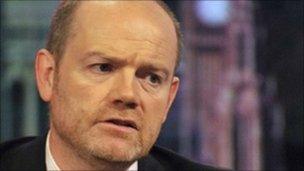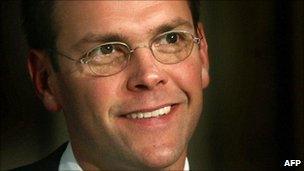Mark Thompson prepares for Edinburgh TV festival
- Published

Mark Thompson is expected to say the BBC has much to be proud of
Broadcasting executives are gathering in Edinburgh for the start of the annual international television festival.
The keynote MacTaggart Lecture will be given by the director general of the BBC, Mark Thompson, at what is a crucial time for the corporation.
Last year during the keynote Edinburgh speech, one of the BBC's biggest competitors, James Murdoch, launched an outspoken attack on the corporation, external.
He called its "dominant" scale "chilling" and said that it should be "far, far smaller".
The BSkyB chairman - who also runs much of News Corporation, the publisher of The Times, Sunday Times, Sun and the News of the World - expressed particular concern over the public funding of the BBC's news output, which he called "state-sponsored journalism".
He claimed it was a "threat to the plurality and independence of news provision", because it made it hard for commercial publishers to earn money from their own news websites.
Constant fire
To some of his audience, the idea of "state-sponsored journalism" was over the top.
But, worryingly for the BBC, Murdoch's general point that the corporation was too big and was harming its commercial rivals, drew murmurs of agreement from other media owners and politicians.
Since then, the BBC has found itself under almost constant fire, not least in the newspapers which now compete with it, as they extend their businesses onto the internet.
In this year's MacTaggart Lecture, Mr Thompson must try to win round the corporation's critics, including some of those commercial rivals and politicians.
But he must also set out his vision for the BBC, as a publicly-funded news and cultural organisation in a world of rapidly changing technology and behaviour - and tighter public finances.
The BBC has been widely criticised, external for the large sums of licence fee money it pays to its stars and top managers.
In the new age of public austerity, Culture Secretary Jeremy Hunt says much needs changing at the BBC.
He has given notice that the next licence fee negotiations - when they begin in a year's time - will be very tough.
Viewers, he says, can expect to pay less.
Bonuses withdrawn
Belatedly, the BBC has responded to some of the criticisms.
Senior executives' pay has been published, then frozen, and bonuses withdrawn.
The highest-paid managers are giving up a month's pay for the next two years and will be asked to withdraw from a scheme which tops up their pensions.
The BBC is to publish the names of its highest-paid presenters and performers and it has proposed radical cuts to its staff pension scheme, to cope with a large deficit.
But that in turn has alienated many BBC employees, who are less highly paid.
Unions are balloting their members for strike action.

Murdoch has said it is unfair for the BBC to provide free news on the web
Other staff are unhappy because their jobs are moving to the north of England, while executives leading the move are keeping their own homes in the south.
Mark Thompson must address all of these different concerns and audiences.
Yet he is also expected to point out that the BBC has much to be proud of.
It still has high support from the public, and large and appreciative audiences for its television, radio and online services.
Innovations such as the BBC website and iPlayer have added to the public benefit provided by the corporation in recent years.
When, asked to make cuts, it tries to close a service such as the digital radio station 6 Music, there is an outcry, external.
On the eve of Mr Thompson's speech, the case for the BBC has been eloquently argued by two academics in what they call An Appeal to the New Parliament in Defence of a British Institution, external.
Professor Steven Barnett and Professor Jean Seaton, of the University of Westminster, call on Parliament to remember "the huge affection in which the BBC is held by the British public, the worldwide admiration which it attracts, and the immeasurable importance of the democratic and cultural contribution which it makes to British life".
The BBC director general could hardly put it better himself. Whether he does so remains to be seen.
- Published10 August 2010
- Published29 June 2010